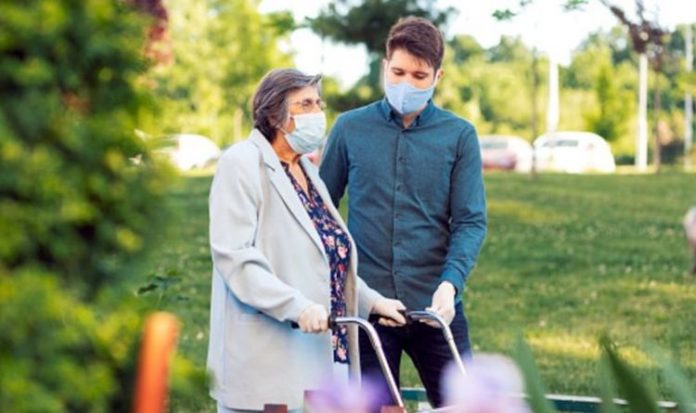Tens of thousands of anguished relatives want “inhumane” Covid care home guidance overturned because they say it is stopping them having close contact with pensioners – some who only have months to live. MPs have been besieged by constituents demanding action and will attempt to force the Department of Health and Social Care into a rethink.
They want family members who are essentially carers themselves given key worker status, access to personal protective equipment and regular testing to allow them into care homes for physical contact.
This, they say, would remove the need for visits to take place behind floor-to-ceiling clear screens or via video, which campaigners say has reduced some of the most vulnerable in Britain to “exhibits in a zoo”.
Today they will meet Care Minister Helen Whately who will set out how Covid-secure visits can “bring loved ones back together during the second wave of the pandemic”.
Speaking in the Westminster Hall debate will be Liberal Democrat deputy leader Daisy Cooper, who said: “Time is running out. Every day that passes, isolation, loneliness and deterioration gets worse for too many of the most vulnerable.
“Every day, friend and family carers have to experience more anguish and separation as their loved ones slip away faster and more painfully than they should.”

Anguished relatives want ‘inhumane’ Covid care home guidance overturned [STOCK PHOTO] (Image: Sladic/Getty Images)
Last week Ms Whately outlined new guidance involving “Covid-secure visiting areas” using screens and windows after Health Secretary Matt Hancock previously promised 11,000 free iPads to reduce “unnecessary visits”. Ms Whateley also told this newspaper that reading about those unable to see their elderly, sick and dying loved ones “brought me to tears”.
Families want demands from campaign group Rights for Residents adopted. They include allowing a designated family or friend carer regular indoor visits without time restrictions.
Deborah Murphy lost her brother Colin to Covid in April at the age of 53 and had to tell her father George Ollier, 84, a resident in a care home in Leighton, Cheshire, through a window that his only son had died.
She said: “I feel my Dad is fading away from life as he can’t see us.
“I have been told if he is dying I would be able to visit. This is heartbreaking. Window visits aren’t enough.”

Health Secretary Matt Hancock (Image: Justin Tallis – WPA Pool/Getty Images)
The Rights for Residents People’s Petition to let loved ones into care homes was set up by Jenny Morrison, 55, after she was prevented from visiting her dementia-stricken mother Jean, 87.
Last night it reached 190,000 signatures. She said: “The £7.5million Matt Hancock proposes to spend on iPads will not help the situation as many are unable to communicate this way.
“Technology is no substitute for human touch. This huge sum of money would be better spent on urgently rolling out rapid testing for care home staff, residents and relatives.”
On September 21 Ms Cooper tabled a parliamentary question asking Mr Hancock to designate relatives of care home residents key workers in response to the Covid outbreak.
But almost two months later she has not received a reply.
Kate Lee, chief executive of Alzheimer’s Society, said: “The prison-style screens the Government proposes – with people speaking through phones – are frankly ridiculous when you consider someone with advanced dementia can often be bed-bound and struggling to speak.

Care Minister Helen Whately (Image: Chris McAndrew/UK Parliament/PA Wire)
“They won’t understand and will be distressed by what’s going on.”
Mr Hancock said: “I know how heartbreaking it has been for families and friends who haven’t been able to see their loved ones. But we must allow families to reunite in the safest way possible.”
Comment by Daisy Cooper
There is a hidden crisis in our nation. Family carers are being separated from their loved ones and it’s causing huge anguish.
A constituent called Steph told me about her mother, who is in a care home. Steph is one of five children and, for a long time, they’ve each spent hours on end lovingly holding their mother’s hands, combing her hair, remembering stories together.
But since the pandemic, they’ve been forced apart. Steph can no longer visit on a daily basis. During the summer, she could make half-hour visits in the home’s garden but now it’s too cold.
She can’t touch her mum or hug her. She can only watch her mum’s rapid mental decline from a distance, for half an hour at a time. And her mum struggles to understand why her children cannot be with her. A lifetime of family love and closeness is being torn apart.
Nine months on from the start of the pandemic, there are still no guidelines in place to protect loved ones from dying from loneliness and isolation. The Government’s latest offer is a woolly, half-baked, token effort: a “trial period” where only some relatives can visit. Carers like Steph tell me this is just adding insult to injury.
The Government needs to restore some basic humanity. That’s why I’m leading a group of 40 MPs who want family or friend carers to have the same “key worker” status as someone who is paid to work in a care home.
They would get the same access to Covid tests and the same access to their loved ones. We also want the cruel 30-minute time limits on visits scrapped. And we want care homes to be protected from being sued if Covid is introduced by a designated visitor, like the NHS is.
Time is running out. Every day that passes, isolation, loneliness and deterioration gets worse for the most vulnerable. And friend and family carers have to experience more anguish as their loved ones slip away faster than they should.
They say that the test of a country is how you treat the most vulnerable: this Government is failing that test.
Daisy Cooper is the Liberal Democrats Deputy Leader







